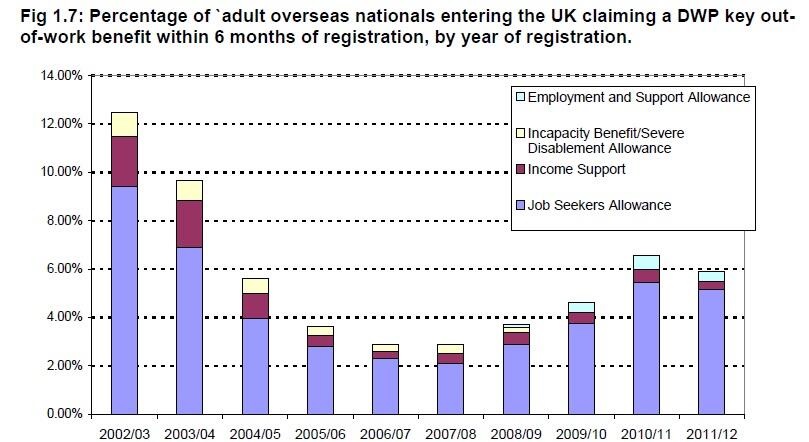Why won’t the government tell us how many EU migrants will be affected by new measures ?
The measures announced by the Prime Minister yesterday to deter “benefit tourists” are a “series of phantom measures to combat a phantom problem“, as Mid-Wales Mike points out, which will have very little impact beyond a day’s headlines: a good summary is provided by the Daily Mail here

The measures announced by the Prime Minister yesterday to deter “benefit tourists” are a “series of phantom measures to combat a phantom problem“, as Mid-Wales Mike points out, which will have very little impact beyond a day’s headlines: a good summary is provided by the Daily Mail here. Making policy on this basis is bad enough: what is truly astonishing, however, is the government’s flat refusal to give us any estimate at all of how many people will be affected, despite the fact that the data are readily to hand.
Let us take the very first proposal set out by the Prime Minister:
We are changing the rules so that no one can come to this country and expect to get out of work benefits immediately; we will not pay them for the first three months.
Leaving aside the question of whether this is a change in policy at all, rightly highlighted by the Mail, how many people will lose benefit as a consequence and how much will it save? When asked by journalists yesterday, both the Home Office and DWP claimed “we don’t have these figures”. That’s just not true. The data is there. This table, published by DWP in August 2013, shows the number of foreign nationals who, within 6 months of registering for a National Insurance Number, claimed out of work benefits.
So the DWP database holds information on when individual foreign nationals registered (and, as shown elsewhere in the publication, their country of origin), and when, if at all, they claimed out of work benefits. Obviously, then, DWP also knows how many European Union nationals claimed out of work benefits within 3 months of registering. It would be the work of a few minutes to produce the above graph for 3 months rather than 6 months, and for EU nationals rather than all foreign nationals. Similarly, with the Prime Minister’s next proposal:
They will only be able to claim for a maximum of six months unless they can prove they have a genuine prospect of employment.
Again, the DWP data will show exactly how many EU nationals have been claiming Jobseekers Allowance for more than 6 months.
In both cases the numbers are likely to be tiny. The graph shows how few foreign nationals claim within 6 months, and a substantial majority of even those probably claim after 3 months. And most jobseekers of any nationality leave within 6 months; the proportion for EU nationals will probably be significantly higher, since they are likely to be moving to areas with relatively buoyant labour markets..
Now, as several people pointed out yesterday based on their own experience, even those numbers would overestimate those affected by the policy changes: nobody gets a National Insurance Number on their first day in the country, since you have to navigate the bureaucracy. So some people who’ve been here longer than three months – and hence entitled even under the new rules – might still claim less than 3 months after registering, and hence show up in the data. And presumably some EU nationals claiming JSA for more than 6 months might be able to argue that they still have a “genuine prospect” of getting a job. Nevertheless, looking at these numbers would give us an excellent idea of both the target group and the maximum numbers impacted; and hence of the financial savings that might be expected.
So why did Ministers and their Press Offices not have these numbers to hand yesterday? There are only two plausible explanations that come to mind:
- Ministers, when making decisions about these policies, didn’t bother to ask their own statisticians what the impact of these policies would be, because they didn’t care. That is, they simply didn’t regard the numbers affected or the potential savings as interesting or relevant. In other words, they are not even pretending that the purpose of these policies is to change anything in the real world.
- alternatively, Ministers realised that the numbers affected would be tiny. And, for precisely that reason, they didn’t ask for the data which would have shown just that – because they knew that to do so would undermine the ostensible justification for the policies in the first place.
Either way, this is not just a failure to base policy on evidence; it is not even “policy-based evidence-making”. Rather, it is making policy while deliberately refusing to ask for directly relevant evidence which already exists. Regardless of what anyone thinks either about labour mobility within the European Union, or the specific measures announced yesterday, this is a total abdication of Ministers’ responsibility to the public and the country..
















